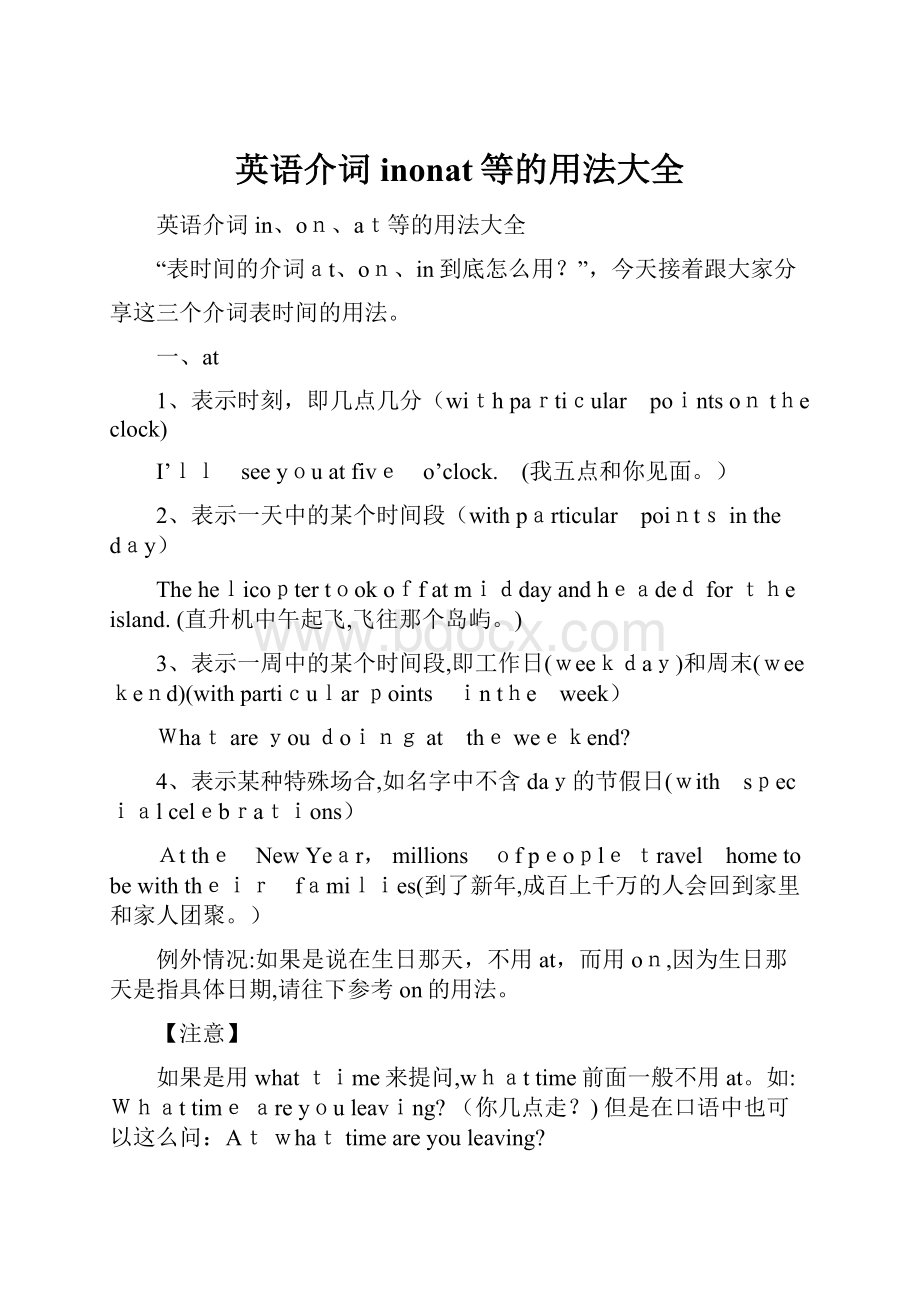英语介词inonat等的用法大全.docx
《英语介词inonat等的用法大全.docx》由会员分享,可在线阅读,更多相关《英语介词inonat等的用法大全.docx(11页珍藏版)》请在冰豆网上搜索。

英语介词inonat等的用法大全
英语介词in、on、at等的用法大全
“表时间的介词at、on、in到底怎么用?
”,今天接着跟大家分享这三个介词表时间的用法。
一、at
1、表示时刻,即几点几分(withparticular pointsonthe clock)
I’ll seeyou atfive o’clock. (我五点和你见面。
)
2、表示一天中的某个时间段(withparticular pointsinthe day)
Thehelicoptertookoff atmidday andheadedforthe island.(直升机中午起飞,飞往那个岛屿。
)
3、表示一周中的某个时间段,即工作日(weekday)和周末(weekend)(withparticularpoints inthe week)
Whatareyoudoing at theweekend?
4、表示某种特殊场合,如名字中不含day的节假日(with specialcelebrations)
Atthe NewYear,millions ofpeopletravel hometobewiththeir families(到了新年,成百上千万的人会回到家里和家人团聚。
)
例外情况:
如果是说在生日那天,不用at,而用on,因为生日那天是指具体日期,请往下参考on的用法。
【注意】
如果是用whattime来提问,whattime前面一般不用at。
如:
Whattimeareyouleaving?
(你几点走?
)但是在口语中也可以这么问:
Atwhattimeareyouleaving?
二、on
1、用在日期前(with dates)
We movedintothishouse on2October 1997.(我们是1997年10月2日搬进这栋房子的。
)
2、用在星期的单数前(with asingulardayof theweekto referto oneoccasion)
I’vegottogotoLondon onFriday.(我周五就到伦敦了。
)
3、用在星期的复数前(with apluraldayof theweektorefertorepeated events)
Theoffice isclosed onFridays.(办公室周五是关门的。
)
特殊情况:
口语中有时会省略on,如:
Do youwork Saturdays?
(你周六上班的吗?
)
4、用在特殊日子前(withspecialdates)
What do you normallydo on yourbirthday?
(你生日那天一般都做些什么?
)
三、in
1、用在一天中的某个时间段前,一般为固定用法(withpartsoftheday)
I’llcome and seeyou inthemorning foracupofcoffee.(我上午来看你,一起喝杯咖啡。
)
2、用在月份前(withmonths)
Weusuallygo camping inJulyorAugust.(我们常在7月或8月份去露营。
)
3、用在年份前(with years)
Thehousewasbuilt in1835.(这座房子是1835年造好的。
)
4、用在季节前(withseasons)
Thegardenis wonderful in the spring whenall the flowerscomeout.(春天里,当所有的花儿都开放时,花园很漂亮。
)
5、用在较长的时间段前(with longperiodsoftime)
Thepopulation ofEuropedoubled inthenineteenth century.(十九世纪时期,欧洲人口翻了一倍。
)
6、用在一段时间前面(tosayhow long ittakessomeone todosomething)
Hewassuch aclevermusician.Hecould learnasong inaboutfive minutes.(他是个很聪明的音乐家,他可以在约5分钟内学会一首歌。
)
7、用在“in+一段时间+'s+time”结构中,表示将来时间,如inayear’s time和in two months’time(with-'sconstructiontosay whensomething willhappen)
Iwon’tsaygoodbyebecausewe’llbe seeingeachother again in threedays’ time.(我不跟你告别了,因为三天后我们就会再见面的。
)
【注意】上面这句话中的in threedays'time也可以用inthreedays。
注意对比下面这个句子:
He ranthe marathon insixhoursand20minutes.(他在马拉松比赛中用时6个小时20分钟。
)
四、特殊情况
1、atoron?
当笼统指代假期或周末时,用at;当特指某个具体的假期或周末时,用on。
如:
Wenevergo away attheNew Year because thetrafficisawful.(新年我们从不出门,因为路上太堵了。
)
OnNewYear’s Day, thewholefamilygetstogether.(在元旦那天,整个家人会团聚在一起。
)
I’llgoandseemy mother at theweekend ifthe weather’sokay. (周末如果天气好,我会去看望我母亲。
)
Thefolk festivalisalwaysheld onthelast weekendinJuly.(这个民间节日总是在7月的最后一个周末举行。
)
注意:
美语里用的更多的是:
onthe weekend。
2、inoron?
当要表示笼统表示一天中的时间段morning、afternoon、evening和night时,一般用in,而且后面要加定冠词the;当表示具体某个时间段时,要用on。
如:
Ialwayswork best inthemorning.I oftengettired in theafternoon. (我上午的工作效率总是最好的,下午经常觉得疲倦。
)
Theshiplefttheharbour onthemorningoftheninthof November.(轮船在11月9日的早上离开了港口。
)
Intheevening theyused tosit outside andwatchthesungoing down.(他们过去经常在傍晚坐在外面看日落。
)
Ithappened onabeautifulsummer’sevening. (这件事情发生在一个美丽的夏日傍晚时分。
)
【注意】
对于night,如果是笼统地讲,就用atnight,中间不插入任何成分;如果是特指某个夜晚,一般用inthenight。
如:
Iwasawake inthenight,thinking about allthethings thathavehappened.(夜里我醒了过来,一直想着发生的事情。
)
‘It’snot safetotravel atnight,’theofficer said.(警官说道:
“夜里出行不安全。
”)
3、attheend or intheend?
atthe end后面一般要接of,表示“在...末”;intheend一般作为固定短语,后面不再接成分,表示“最后”。
如:
Attheend ofthefilm,everyonewas crying. (电影快结束时,每个人都在哭。
)
Ilookedeverywhereforthebookbutcouldn’tfindit,so in theend I bought a new copy.(我到处找书,但还是找不到,所以最后就买了本新的了。
)
4、atthebeginningor inthebeginning?
与end的用法相似,atthebeginning后面一般要接of,表示“在...开始”;inthebeginning一般作为固定短语,后面不再接成分,表示“刚开始”。
如:
Atthebeginning ofeverylesson,theteachertoldthechildren alittlestory. (每节课一开始,老师都会给孩子们讲个小故事。
)
Inthebeginning,nobodyunderstood whatwashappening, butaftersheexplainedeverythingverycarefully,thingswere much clearer. (一开始,大家都不知道发生了什么事情,但是经过她仔细解释之后,一切都明白了。
)
5、不用at、on、in的情况
如果时间前面有each、every,next、last、some、this、that、one、any和all等词时,就不用表时间的介词了。
如:
Heplaysfootball everySaturday.(他每周六都踢足球。
)
Areyoufreeattwoo’clock nextMonday?
(你下周二两点有空吗?
)
Lastsummer werentedavilla in Portugal.(去年夏天,我们在葡萄牙租了一栋别墅。
)
表地点的介词at、on、in到底怎么用?
一、at
1、用在表示地域面积不大的某个点的地方(如饭桌旁、电影院、车站、机场等)前(to refertoa positionorlocationwhichweseeasa point)
Iwas sitting at my desk.(当时我正坐在课桌旁。
)
2、用在公司名称(侧重表达的是工作的单位,而不是工作地点)前(totalkaboutlocations atcompanies,workplaceswhenweseethemasa place ofactivity)
How manypeople areworking at Microsoft?
(有多人在微软工作?
)
3、用在很多人参与的活动场合前(torefertoactivitieswhichinvolveagroupofpeople)
Wereyou at Lisa’sparty/thecinema/the theatre?
(你当时在丽莎的聚会上/电影院里/剧院里吗?
)
4、用在学校前(with school/college/university)
Shealwaysdidwell at school.(她在学校表现一直很好。
)
5、用在具体地址、某人家里前(torefertoanaddressorsomeone'shouse)
They oncelived at number12SouthGeorge’sStreet.(他们曾经住在南乔治街12号。
)
6、用在公共服务场所(totalkaboutpublicplaceswherewegettreatments,such as ahairdresser’sordoctor’ssurgery)
Ican’tmeetatfour.I’ll be at the hairdresser’suntil five.(四点我无法跟你碰面。
我在美发店要呆到五点。
)
7、用在大部分商店前(torefertomostshops)
Look whatIbought at thebutcher’stoday.(看看我今天在肉店都买了些什么。
)
8、用在旅途中经过的地点前(to refertoaplacewhich isapartofourjourney)
Westoppedataverynicevillage.(我们途经一个很漂亮的村庄。
)
9、用在不含day的节假日前(to refer toaholidaywithout“day”in its name)
People willalwaysenjoyabigdinnerat Christmas.(人们在圣诞节总会享用一顿大餐。
)
【特殊用法】
at home-atwork-attheseaside-atsea (ona voyage) - at reception-atthecornerofastreet - attheback/frontofabuilding/group of people,etc. -arriveatsmall places orsome events
二、on
1、用在任何物体或地点的表面前(torefertoapositiononany surface)
Iknow Ileftmywallet on thetable. (我知道我把钱包落在桌子上了。
)
2、用在道路和河海湖前(todescribe apositionalongaroad orriverorbythesea or byalake)
Dublinis on theeastcoastofIreland. (都柏林位于爱尔兰的东部海岸。
)
3、用在建筑物的楼层前(totalkabout afloorinabuilding)
They live on the15thfloor.(他们住在15楼。
)
4、用在公共交通工具前(totalkaboutbeingphysically on publictransport)
Iwas on thetrainwhenshephoned.(她给我打电话时,我在火车上。
)
注意:
当我们描述旅游时选择的交通工具时,一般用by,如:
He went toParisbyair.(他坐飞机去了巴黎。
)但是,如果要表达走路,则用onfoot。
5、用在小岛前(with small islands)
Shespentherholidayonasmall island.(她在一个小岛上度的假。
)
【特殊用法】
ontheleft-on theright-on theway-onholiday-on theradio -ontelevision- onahorse-on theback/ frontofa letter /pieceofpaperetc.
三、in
1、用在某个地方的内部前(totalkaboutlocationswithina largerarea)
I know mybookis somewhere in thisroom.Can anyoneseeit?
(我知道我的书就在这个房间的什么地方。
有谁看到吗?
)
2、用在物理意义上的工作地点前(totalkaboutworkplaces whenwe seethemasaphysicallocation)
She works in anopen-planoffice.(她在一个开敞式的办公室里工作。
)
注意:
当表示农场(farm)时,一般用on,如:
I'vealwayswantedtowork ona farm.(我一直想在农场里工作。
)
3、用在class前(withclass)
Hefounditdifficulttoconcentrate in class.(他觉得很难在课上集中注意力。
)
4、用在国家、城市、县镇或其他地域前(with countries,cities, counties, townsor places assuch)
TheyliveinNewYork.(他们住在纽约。
)
【特殊用法】
inthenewspaper-in bed -inhospital -inprison-in thestreet-inthesky-inan armchair (sit) - inaphotograph-ina picture-inamirror-inthecornerofaroom - intheback/ frontofacar- arrivein a countryortown
图解《新概念英语》语法之介词
介词作为所有词类中使用面较广的词类,在用法上较难归类,因为介词很多时候都是因为约定俗成,跟形容词、副词和动词等形成了诸多固定的搭配用法,很难找出规律性的内容,所以对于学习者来说,介词的学习和掌握更多的是要靠不断地识记和积累。
1表时间
1.1 in表示较长时间,如世纪、朝代、时代、年、季节、月及一般(非特指)的早、中、晚等。
如:
inthe20th century,inthe 1950s,in1989, insummer,inJanuary,inthe morning,inone’slife,inone’sthirties。
1.2on表示具体某一天及其早、中、晚。
如:
onMay1st,on Monday,on New Year’sDay, onacoldnightinJanuary,on afine morning,onSundayafternoon等。
1.3 at表示某一时刻或较短暂的时间,或泛指圣诞节,复活节等。
如:
at3:
20,atthistimeofyear,at thebeginningof, attheend of…, at theageof…,atChristmas,at night,atnoon, atthis moment等。
1.4在last, next,this,that,some,every等词之前一律不用介词。
如:
Theygotoschool everydayfromMondaytoFriday.
2表地点
2.1表方位的in,on, to。
in表示“在…内”,on表示“与…相邻”,to表示“在…之外,又不相邻”。
2.2表在某地的at,in, on。
at表示较小的地点,in表示较大的地方,on表示在一个平面上。
3表方式
3.1by表用某种方法、手段或泛指某种交通工具。
如:
bybus。
例外情况:
on foot。
3.2with表示某种工具、手段,一般接具体的工具和手段。
如:
Shebroke the table with ahammer.
3.3 in表示用某种方式,用某种语言(语调、笔墨、颜色)等。
如:
Sheisin redtoday。
4 表所属关系
4.1 of表示“属于…的”,表示数量或种类。
如:
Hereisa cupofteaforyou.
4.2from表示“是哪里人”以及时间或时间的起点来自。
如:
Whereareyou from?
4.3about表示关于等。
如:
I know nothingabout him.
5 其他用法
5.1常见的固定短语:
inaminute一会儿、立刻;in ashortwhile一会儿、不久;inahurry匆匆忙忙;indanger在危险中;infull全部地、详细地;inaword一句话;in all总共;in every case不管怎样;intheend最后;inspiteof尽管;in person亲自;infact事实上;ingoodhealth身体健康的;infrontof在……前面;insomeways在某些方面;incommon共同的;inpublic当众
--